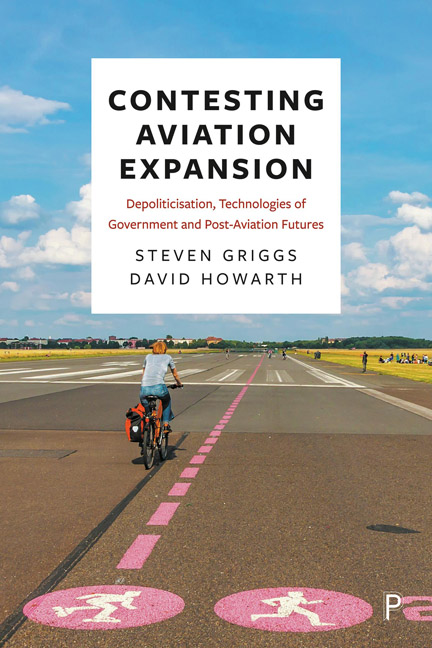 Contesting Aviation Expansion
Contesting Aviation Expansion Book contents
- Frontmatter
- Contents
- List of figures and tables
- List of abbreviations
- Acknowledgements
- Introduction: Problematising the dilemmas of UK airport expansion – puzzles and research strategies
- 1 Depoliticisation, discourse and policy hegemony
- 2 Governing by numbers: fantasies of forecasting, ‘predict and provide’ and the technologies of government
- 3 The anatomy of an expert Commission: Howard Davies, rhetorical reframing and the performance of leadership
- 4 Repoliticising aviation policy: law, planning and persistent activism
- 5 Extreme turbulence: problematisations, multiple crises and new demands
- 6 ‘What if…?’ A manifesto for the green transformation of aviation
- Conclusion: Staying grounded
- Notes
- References
- Index
5 - Extreme turbulence: problematisations, multiple crises and new demands
Published online by Cambridge University Press: 18 January 2024
- Frontmatter
- Contents
- List of figures and tables
- List of abbreviations
- Acknowledgements
- Introduction: Problematising the dilemmas of UK airport expansion – puzzles and research strategies
- 1 Depoliticisation, discourse and policy hegemony
- 2 Governing by numbers: fantasies of forecasting, ‘predict and provide’ and the technologies of government
- 3 The anatomy of an expert Commission: Howard Davies, rhetorical reframing and the performance of leadership
- 4 Repoliticising aviation policy: law, planning and persistent activism
- 5 Extreme turbulence: problematisations, multiple crises and new demands
- 6 ‘What if…?’ A manifesto for the green transformation of aviation
- Conclusion: Staying grounded
- Notes
- References
- Index
Summary
The victory of campaigners against the planned Heathrow expansion in the Court of Appeal in February 2020 came almost a month before the UK entered its first lockdown to combat rising COVID-19 infections within its population. The collapse of international travel following the pandemic had severe repercussions across the aviation industry, with unprecedented collapses in passenger numbers, the grounding of airlines and closing of runways, bringing waves of job losses in airlines and airports. In April 2020, scheduled flights in the UK fell by 92.6 per cent compared to the same month in 2019. Airlines were still operating only an estimated 20 per cent of scheduled flights 7 months later in November 2020 (Sun et al, 2021). In June 2020, the House of Commons Transport Committee had already called for targeted measures to support the aviation industry, including 12 months of business rate relief for airlines and airports, and the suspension of APD on flights for 6 months (Transport Committee, 2020: 3– 4).
As passenger numbers in the aviation industry collapsed, the case for additional capacity and the economic arguments in favour of expansion and its financing were at best faltering. Addressing MPs in May 2020, John Holland-Kaye, chief executive of Heathrow Airport, recognised that the impact of the pandemic meant that a new runway may only ‘be needed in 10 to 15 years’ time’ (No Third Runway Coalition, 2020). He later estimated that Heathrow Airport had accumulated losses of some £3 billion during 2020 and the first half of 2021, in part due to the fixed costs of airport operations (Finance Monthly, 2021). Gatwick Airport fared no better, experiencing losses of approximately three-quarters of a billion pounds, as well as cutting its workforce in half. Its chief executive, Stewart Wingate, argued that the financial stability of the airport was not helped by the loss of flights to Heathrow as airlines concentrated their operations at the UK international hub (Transport Committee, 2021a).
This chapter contextualises and analyses the COVID-19 conjuncture, reprising and drawing together the multiple threads of our genealogy of the technologies and techniques that UK governments have used to tackle the problems of aviation expansion and its demands for more and efficient airport capacity.
- Type
- Chapter
- Information
- Contesting Aviation ExpansionDepoliticisation, Technologies of Government and Post-Aviation Futures, pp. 130 - 151Publisher: Bristol University PressPrint publication year: 2023


